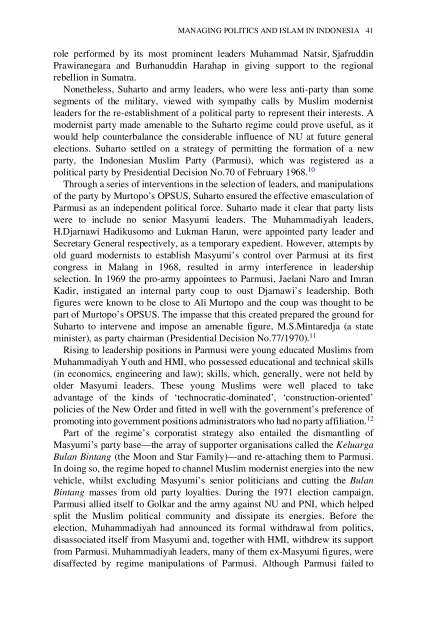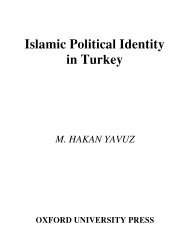You also want an ePaper? Increase the reach of your titles
YUMPU automatically turns print PDFs into web optimized ePapers that Google loves.
MANAGING POLITICS AND ISLAM IN INDONESIA 41role performed by its most prom<strong>in</strong>ent leaders Muhammad Natsir, Sjafrudd<strong>in</strong>Prawiranegara <strong>and</strong> Burhanudd<strong>in</strong> Harahap <strong>in</strong> giv<strong>in</strong>g support to the regionalrebellion <strong>in</strong> Sumatra.Nonetheless, Suharto <strong>and</strong> army leaders, who were less anti-party than somesegments of the military, viewed with sympathy calls by Muslim modernistleaders for the re-establishment of a political party to represent their <strong>in</strong>terests. Amodernist party made amenable to the Suharto regime could prove useful, as itwould help counterbalance the considerable <strong>in</strong>fluence of NU at future generalelections. Suharto settled on a strategy of permitt<strong>in</strong>g the formation of a newparty, the <strong>Indonesia</strong>n Muslim Party (Parmusi), which was registered as apolitical party by Presidential Decision No.70 of February 1968. 10Through a series of <strong>in</strong>terventions <strong>in</strong> the selection of leaders, <strong>and</strong> manipulationsof the party by Murtopo’s OPSUS, Suharto ensured the effective emasculation ofParmusi as an <strong>in</strong>dependent political force. Suharto made it clear that party listswere to <strong>in</strong>clude no senior Masyumi leaders. The Muhammadiyah leaders,H.Djarnawi Hadikusomo <strong>and</strong> Lukman Harun, were appo<strong>in</strong>ted party leader <strong>and</strong>Secretary General respectively, as a temporary expedient. However, attempts byold guard modernists to establish Masyumi’s control over Parmusi at its firstcongress <strong>in</strong> Malang <strong>in</strong> 1968, resulted <strong>in</strong> army <strong>in</strong>terference <strong>in</strong> leadershipselection. In 1969 the pro-army appo<strong>in</strong>tees to Parmusi, Jaelani Naro <strong>and</strong> ImranKadir, <strong>in</strong>stigated an <strong>in</strong>ternal party coup to oust Djarnawi’s leadership. Bothfigures were known to be close to Ali Murtopo <strong>and</strong> the coup was thought to bepart of Murtopo’s OPSUS. The impasse that this created prepared the ground forSuharto to <strong>in</strong>tervene <strong>and</strong> impose an amenable figure, M.S.M<strong>in</strong>taredja (a statem<strong>in</strong>ister), as party chairman (Presidential Decision No.77/1970). 11Ris<strong>in</strong>g to leadership positions <strong>in</strong> Parmusi were young educated Muslims fromMuhammadiyah Youth <strong>and</strong> HMI, who possessed educational <strong>and</strong> technical skills(<strong>in</strong> economics, eng<strong>in</strong>eer<strong>in</strong>g <strong>and</strong> law); skills, which, generally, were not held byolder Masyumi leaders. These young Muslims were well placed to takeadvantage of the k<strong>in</strong>ds of ‘technocratic-dom<strong>in</strong>ated’, ‘construction-oriented’policies of the New Order <strong>and</strong> fitted <strong>in</strong> well with the government’s preference ofpromot<strong>in</strong>g <strong>in</strong>to government positions adm<strong>in</strong>istrators who had no party affiliation. 12Part of the regime’s corporatist strategy also entailed the dismantl<strong>in</strong>g ofMasyumi’s party base—the array of supporter organisations called the KeluargaBulan B<strong>in</strong>tang (the Moon <strong>and</strong> Star Family)—<strong>and</strong> re-attach<strong>in</strong>g them to Parmusi.In do<strong>in</strong>g so, the regime hoped to channel Muslim modernist energies <strong>in</strong>to the newvehicle, whilst exclud<strong>in</strong>g Masyumi’s senior politicians <strong>and</strong> cutt<strong>in</strong>g the BulanB<strong>in</strong>tang masses from old party loyalties. Dur<strong>in</strong>g the 1971 election campaign,Parmusi allied itself to Golkar <strong>and</strong> the army aga<strong>in</strong>st NU <strong>and</strong> PNI, which helpedsplit the Muslim political community <strong>and</strong> dissipate its energies. Before theelection, Muhammadiyah had announced its formal withdrawal from politics,disassociated itself from Masyumi <strong>and</strong>, together with HMI, withdrew its supportfrom Parmusi. Muhammadiyah leaders, many of them ex-Masyumi figures, weredisaffected by regime manipulations of Parmusi. Although Parmusi failed to




